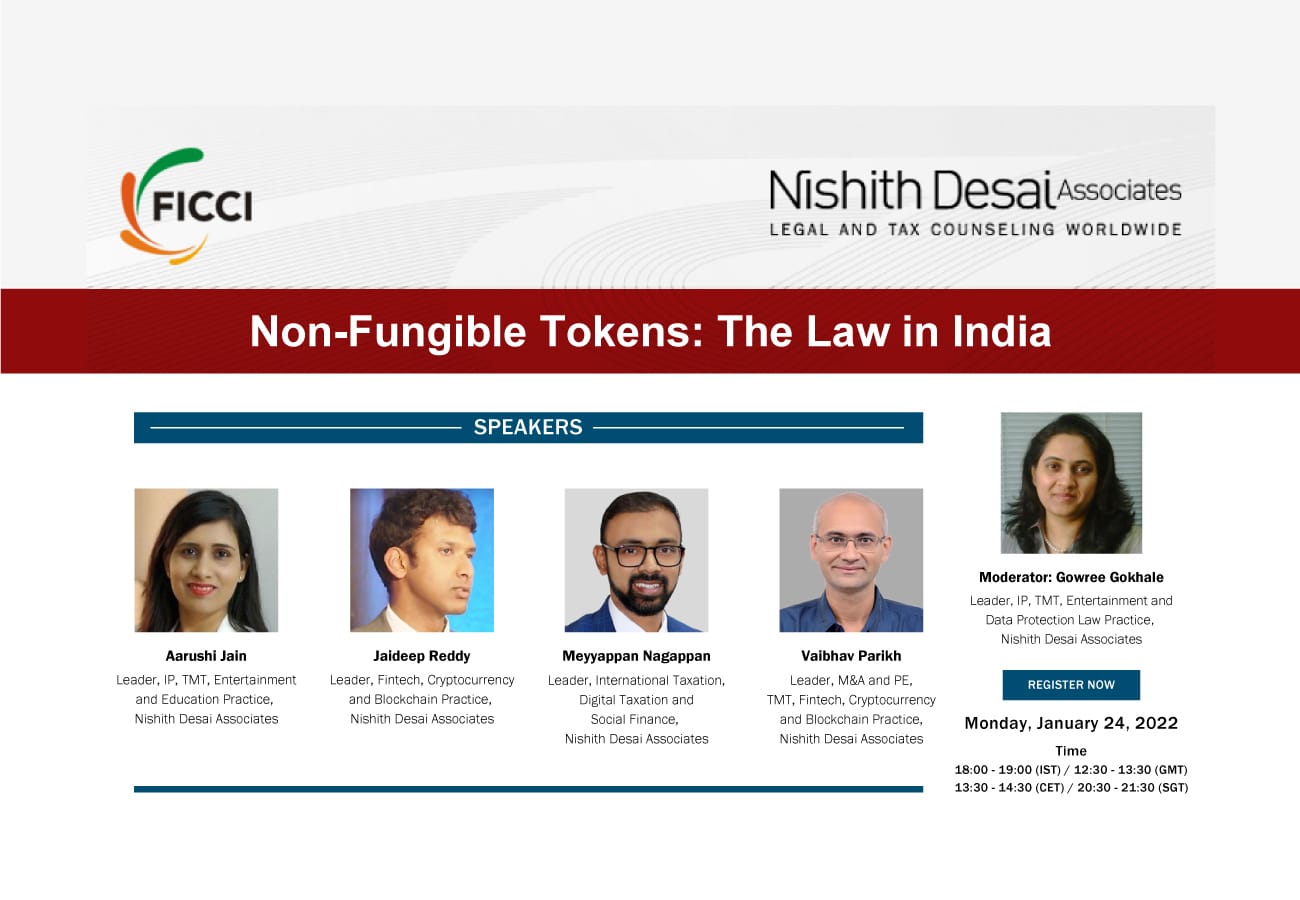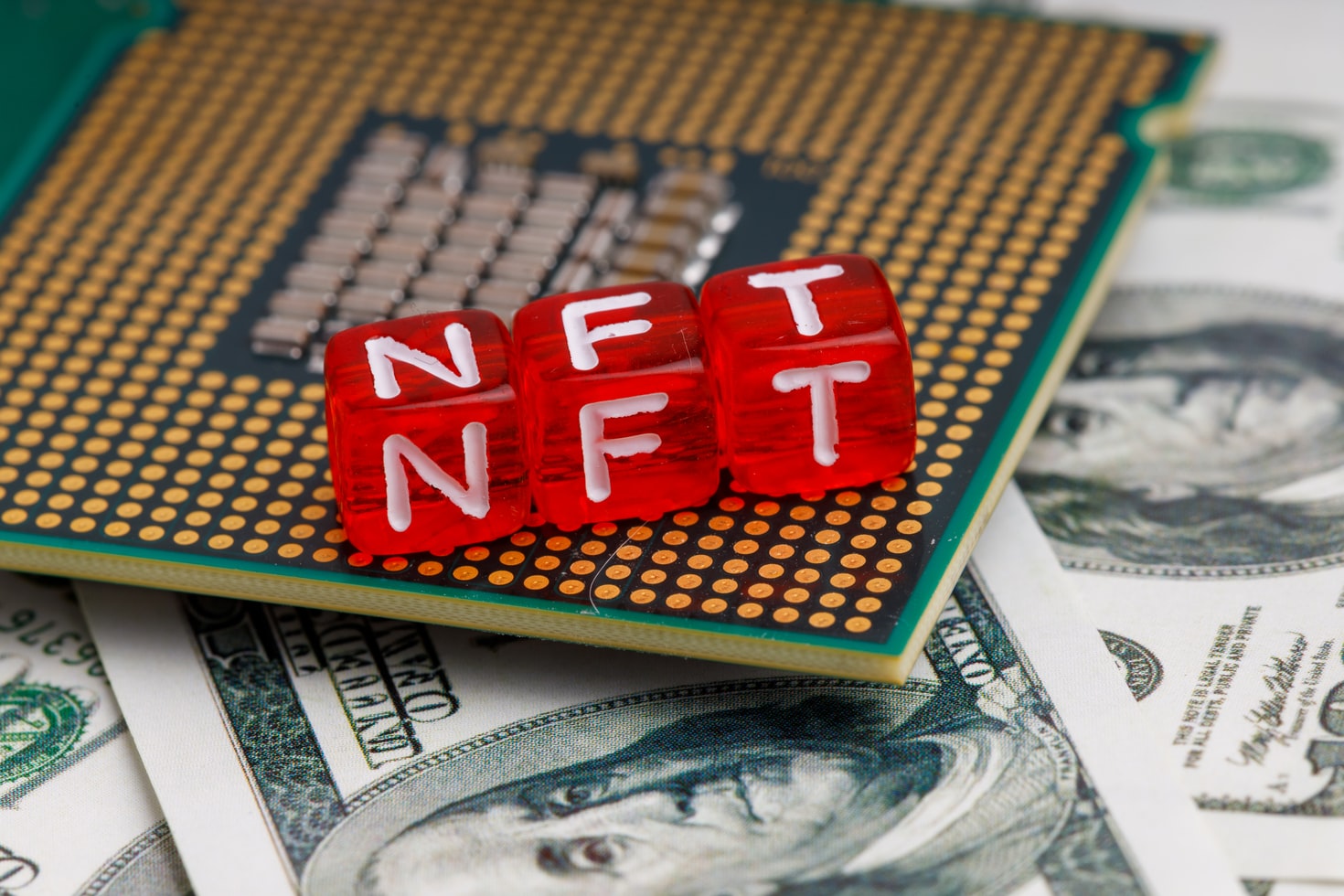
Nishith Desai Associates held a Webinar on Monday, 24th January 22 on Non-Fungible Tokens: The law in India supported by the Federation of Indian Chamber of Commerce and Industries (FICCI) wherein a panel of experts shared legal insights concerning NFTs. CreativeFirst is delighted to present highlights from the session below.
With moderator Gauri Gokhale, leader, IP, TMT, Entertainment and Data Protection Law Practice at NDA and panellists, Arushi Jain, leader IP, TMT, Entertainment and Education practice, Jaideep Reddy, leader, Fintech, Cryptocurrency, and Blockchain practice, Vaibhav Parikh, leader, M&A and PE, TMT, Fintech, Cryptocurrency, and Blockchain practice and Ipsita Agarwal, international Tax and Funds Formation Practice, the webinar began with an introduction to NFTs by Jaideep Reddy.
The webinar aimed to open discussion about the current surge in the NFT market concerning the Media and Entertainment industry instead of when NFTs were first launched in 2014-15. In the span of 8 years, the market has seen a wide range of cryptocurrency applications, one of the prominent being NFTs.
To explain NFTs in simple terms, Jaideep Reddy and Vaibhav Parikh made the following points. NFTs are like PDF files. First, what the PDF file contains is what’s important. Thus, NFT can be an image or a music piece; however, NFTs are unique and come with attributes of their own instead of a JPEG file and are not interchangeable as cryptocurrency is into dollars and vice versa. The various attributes of the NFTs and the reason for their exclusiveness and popularity. These include scarcity, uniqueness, utility, cryptography, and transparency.
NFTs allow you to receive a royalty on the sales of a particular item. They also allow unlockable content where only the owner of the NFT will be able to see the contents of the NFT, stipulating a higher value for it. With big players like Mastercard entering the ecosystem, people don’t necessarily need to have a separate crypto wallet to purchase an NFT.
The use of NFTs in art, painting, music, films, sports and gaming is ever increasing. Furthermore, with the metaverse coming into the picture, Parikh said that NFTs would play a critical role in tourism and virtual real estate. “NFTs are like signed/ autographed posters but with greater functionality and exclusivity”, said Parikh. The best part of NFT is that once sold, you get the money you priced the NFT for and become a part of the selling chain earning some royalty each time the NFT is passed on in the chain of buyers. So, in a way, each sale can earn you some money. Thus, the possibilities of what NFTs can bring to the crypto world are endless and exciting.

Moving on to IP and Copyrights, Aarushi Jain sheds light on how rights play out in terms of NFTs in the Entertainment and Media category and if/ when one wants to start making NFTs without these rights do they go about it. “As per the law, in the film industry scenario, it is the producer who is considered the owner of the copyright in the film per se.” However, in recent years, exploitation rights have added nuance to copyrights.
The panel further discussed how liabilities pan out in NFTs and who can be held accountable for infringement allegations as Gowree posed the question of liability and contractual relationships concerning NFTs. NFT platforms are marketplaces that are mere facilitators for buyers and sellers. Hence, they fall under the definition of ‘Intermediaries’, a construct under the Information and Technology Act. Intermediaries have some stake harbour as far as any infringement claim is concerned. Hence, a platform hosting NFTs can’t necessarily be held liable but has certain responsibilities, including taking down content that violates the platform policy like some social media platforms are doing nowadays. A publisher of that content then has very little to defend their liability.
As for Exchange Control Laws that are in play for Indian companies who want to create NFTs in the marketplaces with respect to Foreign Exchange Management Act (FEMA), Jaideep Reddy explains, it is a burning issue because these are inherently borderless technologies that enable the transfer of value across borders and FEMA restricts and controls the same. NFT is categorized as a ‘digital manifestation of something’ in the light of FEMA, tax exchange, etc. So the underlined thing is if the NFT represents a ticket, it will probably be treated as a ticket under FEMA; similar would be the case for software and IP.
Often an NFT will be treated as a copyrightable work under FEMA, assuming it represents a copyrightable work; hence the FEMA laws would apply. So selling an NFT cross-broader is completely fine, but receiving it could violate FEMA. Anything within India does not violate FEMA, but anything cross-border violates FEMA. A way out of this is to list yourself outside India or appoint someone who can receive and sell for you, to put it simply.
Ipsita Agarwal then shared the tax treatment in the NFT framework, both from an income tax perspective and a GST perspective. She brought to everyone’s notice that tax authorities have not issued any formal guidance on the taxation of NFTs until now except for the Australian Tax Office, as of Monday, 24th Jan 22. The office also clarified that taxation of NFTs would follow the same principle as taxation of cryptocurrencies. As such, there is no clear-cut guidance on how transactions in NFTs will be taxed. From a direct tax perspective, taxation of NFTs will differ for each participant participating in the transaction and the involvement in that transaction.
Coming to how NFTs are created and explaining the tax implications that may apply to a trader, the income generated may either be classified as business income or classified as a capital gain income if the person is in the business of trading NFTs. As for GST for traders, unlike the income tax act, the word ‘Business’ is very widely defined under the GST guidelines, so much so that it includes trade commerce vocation whether or not the volume frequency continuity or regularity of such transactions is high. Therefore, even in cases where a person is doing a one-off transaction with NFT, that person may be considered in the business of selling or trading an NFT, and GST may be applicable. However, the market right now has a long way to go when it comes to specific Tax laws for the same.
The panel then was open to the questions by the attendees of the webinar.
Watch more on the video below.